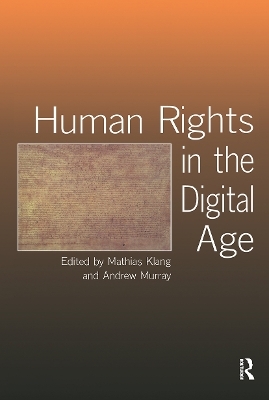
Human Rights in the Digital Age
Routledge Cavendish (Verlag)
978-1-904385-31-8 (ISBN)
The digital age began in 1939 with the construction of the first digital computer. In the sixty-five years that have followed, the influence of digitisation on our everyday lives has grown steadily and today digital technology has a greater influence on our lives than at any time since its development. This book examines the role played by digital technology in both the exercise and suppression of human rights. The global digital environment has allowed us to reinterpret the concept of universal human rights. Discourse on human rights need no longer be limited by national or cultural boundaries and individuals have the ability to create new forms in which to exercise their rights or even to bypass national limitations to rights. The defence of such rights is meanwhile under constant assault by the newfound ability of states to both suppress and control individual rights through the application of these same digital technologies.
This book gathers together an international group of experts working within this rapidly developing area of law and technology and focuses their attantion on the specific interaction between human rights and digital technology. This is the first work to explore the challenges brought about by digital technology to fundamental freedoms such as privacy, freedom of expression, access, assembly and dignity. It is essential reading for anyone who fears digital technology will lead to the 'Big Brother' state.
Mathias Klang is a lecturer and researcher in legal informatics at the University of Goteborg where he teaches courses in electronic commerce and computer ethics. His research interests are primarily in the areas of democracy, human rights and ethics in relation to technology and cyberspace. Mathias is currently working on the completion of his PhD thesis on freedom of expression in digital environments. Andrew Murray is Lecturer in IT and Internet Law at the Department of Law, London School of Economics. He teaches courses in Information Technology the Law, Internet New Media Regulation and Media Communications Regulation.
Introduction: Human Rights and Equity in Cyberspace. Pixels, Pimps and Prostitutes: Human Rights and the Cyber Sex Trade. The New Face of Child Pornography. Regulating Hatred. Free Expression and Defamation. Internet Service Providers and Liability. The Digital Divide: Why the 'the' is misleading. Filtering, Blocking and Rating: Chaperones or Censorship? Firewalls and Power: An Overview of Global State Censorship of the Internet. Cyber Property. Virtual Sit-Ins, Civil Disobedience and Cyberterrorism. Privacy: Charting its Developments and Prospects. Employee Surveillance. Privacy, Surveillance and Identity. Should States Have a Right to Informational Privacy? Code, Access Control. Biotechnology and Rights: Where We are Coming From and Where are we Going?
| Erscheint lt. Verlag | 23.12.2004 |
|---|---|
| Verlagsort | London |
| Sprache | englisch |
| Maße | 156 x 234 mm |
| Gewicht | 408 g |
| Themenwelt | Informatik ► Software Entwicklung ► User Interfaces (HCI) |
| Recht / Steuern ► Allgemeines / Lexika | |
| Recht / Steuern ► Arbeits- / Sozialrecht ► Sozialrecht | |
| Recht / Steuern ► EU / Internationales Recht | |
| Recht / Steuern ► Öffentliches Recht ► Völkerrecht | |
| Sozialwissenschaften ► Ethnologie | |
| Sozialwissenschaften ► Soziologie | |
| ISBN-10 | 1-904385-31-1 / 1904385311 |
| ISBN-13 | 978-1-904385-31-8 / 9781904385318 |
| Zustand | Neuware |
| Haben Sie eine Frage zum Produkt? |
aus dem Bereich


